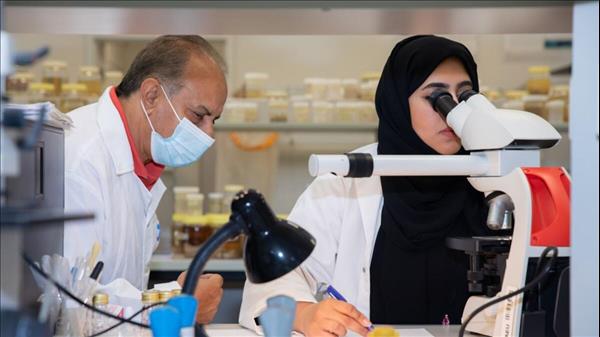
UAE University Researchers Discover New Type Of Freshwater Crustacean
Published: Sat 10 Sep 2022, 3:26 PM
Last updated: Sat 10 Sep 2022, 4:25 PM
A team of researchers from UAE University (UAEU) succeeded in discovering an unknown type of crustacean, 'Diplostraca', of microorganisms in the animal kingdom in Arabian Peninsula within the group of common species.
The team from the university's Department of Biology at the College of Science in cooperation with several researchers and international centers in Russia,
The research was published among the most prestigious scientific journals in the world, led by Professor Waleed Hamza - from the Department of Biology at the College of Science at the UAE University, in collaboration with Professor Alex Kotov, and researcher Anna Nertina from the Severtsov Institute of Ecology and Evolution in Russia, Dr Khaled Amiri - Director of Khalifa Center for Genetic Engineering and Biotechnology, researchers from the Papanin Institute for Biology of Inland Waters, at the Russian Academy of Sciences, and a master's student from the Department of Biology, and Shamma Al Neyadi, who spent 21 days at the Russian Institute to perfect her drawings using the most advanced camera Lucida.
Professor Waleed Hamza (Principal investigator)- from the Department of Biology at UAE University, said: 'I believe that the discovery of new species that grew in temporary bodies of fresh water, will open the door for many researchers to explore different environments not only in the United Arab Emirates, but in the Arabian Peninsula.
'The region still has a lot to discover, in fact, expanding our research field and cooperating with world-class institutes will positively enhance our research capabilities especially when UAE young researchers participate, which will lead to building national capacities capable of exploring the resources in their land.'
He added: 'The importance of this scientific discovery comes in increasing the biodiversity list of living organisms, especially in the United Arab Emirates. This increases the value of preserving wetland ecosystems as a vital resource that preserves the Earth's environment and living creatures.'
Researchers have found a new species of microorganism in the deserts of the Arabian Peninsula. This discovery allows to solve some problems related to the history of these daphnids in the northern hemisphere and to follow the dispersal of these microorganisms across North Africa and the Middle East. The team studied the patterns of the distribution of biodiversity and the history of its formation in continental waters. The most scientific publications about this genus are related to the sub-genus while no similar study has been done, for microorganisms that live mainly in temporary water bodies.
Professor Waleed Hamza, pointed out, 'We succeeded in reaching the identity of the organism, identified as a new species and named it 'Daphnia arabica sp. nov,' to refer to its presence in the Arabian Peninsula' and to distinguish it from other species, belonging to another group, which live mainly in temporary bodies of fresh water. The researchers collected a core sample of dry sediment behind the Shuwaib Dam (Al Ain City) in March 2018.
ALSO READ:
- Dubai unveils one of world's largest flawless pink diamonds
- 'Nature strikes back': UN chief visits areas of Pakistan devastated by floods
The sediment was immersed in drinking water for three weeks, the sediment-encapsulated eggs hatched, and disintegrated organisms were isolated and grown in the Marine Biology Lab at the College of Science at the United Arab Emirates University, with the help of the Khalifa Center for Genetic Engineering & Biotechnology and the Russian Academy of Sciences in Moscow. The isolated organisms deeply underwent microscopic morphometric, molecular (DNA), and further genomic and morphologic analyses using the modern 'camera lucida'.

Legal Disclaimer:
MENAFN provides the
information “as is” without warranty of any kind. We do not accept
any responsibility or liability for the accuracy, content, images,
videos, licenses, completeness, legality, or reliability of the information
contained in this article. If you have any complaints or copyright
issues related to this article, kindly contact the provider above.


















Comments
No comment